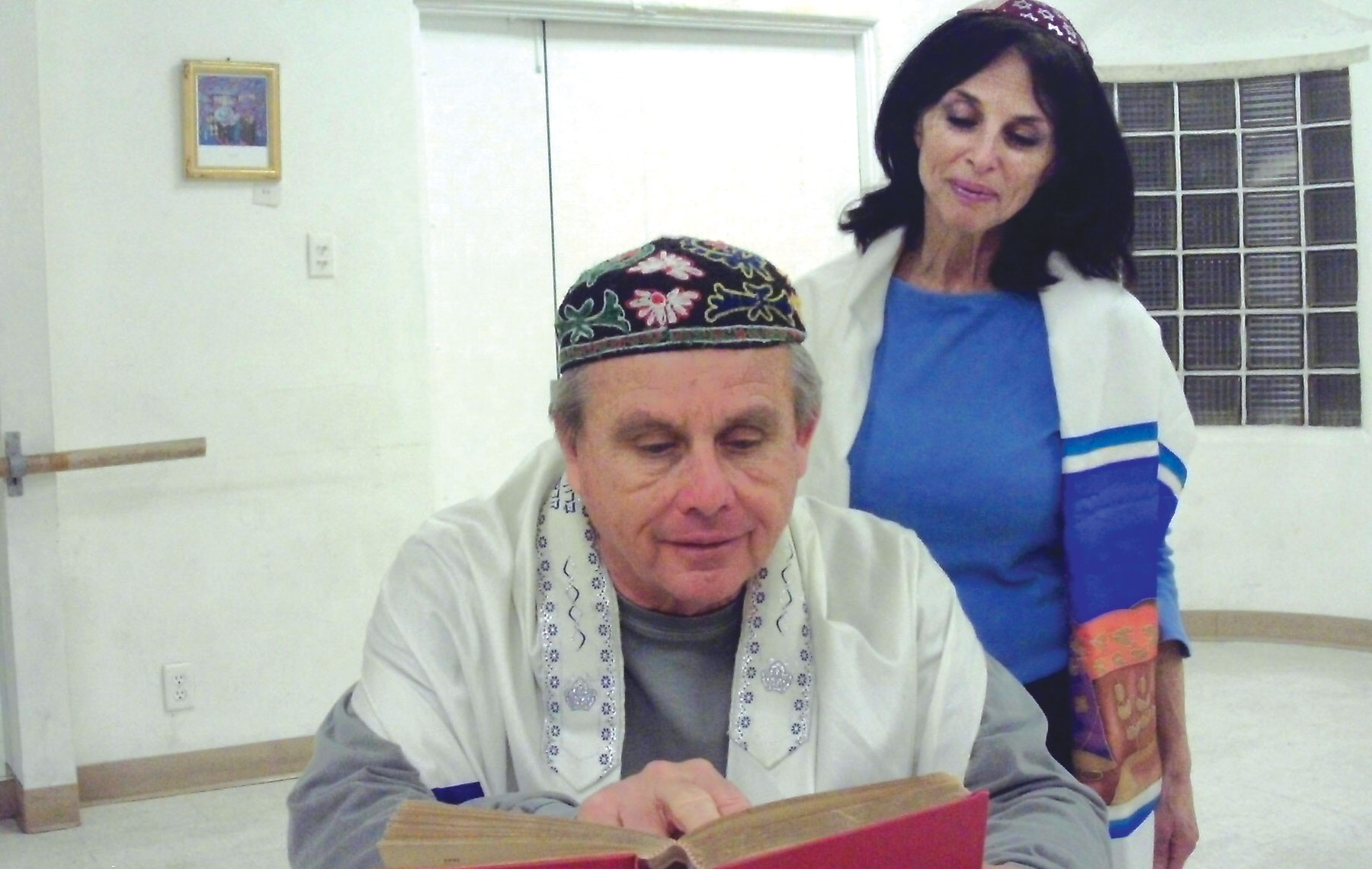 R. Emmett Lee and Pamela Heffler in “Bar Mitzvah Boy.” Photo by Gerri Miller
R. Emmett Lee and Pamela Heffler in “Bar Mitzvah Boy.” Photo by Gerri Miller A secular Jew finds his faith while a rabbi struggles to hold onto hers in the West Coast Jewish Theatre’s “Bar Mitzvah Boy,” a comedy-drama opening March 22 at the Miles Memorial Playhouse in Santa Monica.
The story follows Joey Brant (R. Emmett Lee), a divorce lawyer and secular Jew who lied about having had a bar mitzvah, and seeks to make it right before his grandson’s bar mitzvah. To prepare for the ceremony, he persuades Rabbi Michael Levitz-Sharon (Pamela Heffler) to give him private lessons. As he reconnects to Judaism, she finds her strong faith challenged as she struggles to deal with her daughter’s terminal illness and the breakup of her marriage.
The 2017 winner of the Jewish Plays Project Award, it raises provocative questions with poignancy and humor, about belief and what it means to be Jewish, while exploring such themes as tikkun olam and the importance of community and ritual.
West Coast Jewish Theatre (WCJT) Artistic Director Howard Teichman said he chose to produce “Bar Mitzvah Boy” because “it asks all the right questions and deals with things Jews deal with.” He also liked the redemptive nature of the story and the fact that the rabbi is female. “There are so many things we can learn from this play,” he said after a rehearsal. “We are here not only to entertain but educate, and through these kinds of plays, we find ways to connect as Jews and give an opportunity to Jewish writers, whether they’re known or hardly known.”
Victoria, B.C.-based playwright Mark Leiren-Young took his inspiration from several real-life sources: a friend’s admission that he didn’t feel Jewish because he didn’t have a bar mitzvah, the female rabbi that bat mitzvahed his niece, and the niece questioning God’s existence when her friend was diagnosed with a terminal disease. That last element coalesced the narrative he’d been working on for years. “I knew Joey was going to find his faith but it never occurred to me until that moment what it would take for the rabbi to lose hers,” Leiren-Young said in a phone interview.
“We are here not only to entertain but educate, and through these kinds of plays we find ways to connect as Jews and give an opportunity to Jewish writers, whether they’re known or hardly known.”
— Howard Teichman
Leiren-Young consulted with rabbis to make sure everything was kosher. “One of my oldest friends is married to a rabbi and we had long discussions about what the Torah portion should be. She vetted all the arguments and discussions to make sure there was nothing a rabbi would object to,” he said.
Raised in a “fairly religious” home, Leiren-Young had a Jewish day school education. On the day of his bar mitzvah, the family’s car was sideswiped in a snowstorm on the way to the synagogue. “The connection [to Judaism] has gotten even stronger since writing the play,” he said. “I’ve found myself going back to shul more.”
For Teichman, a Holocaust survivor’s son who was raised Orthodox, he turned to his faith last year when he nearly died from pulmonary blood clots, which left him blind in his right eye. “I’m here for a reason,” he said.
Heffler had never played a Jewish character before Rabbi Michael, and was eager to do so. She has fond memories of growing up in a Conservative Jewish family in Maryland, where she was bat mitzvah, confirmed, and led services as a junior cantor. “I hope [audiences] think about their faith in God and connect with the humor and also dealing with loss,” she said.
Emmett Lee’s experience with Judaism was limited to a few bar mitzvahs that he attended while growing up in Chicago and Gary, Ind., but he “related to the idea of spiritual quests and the journey toward faith.” Although he didn’t know what tefillin are and reciting Hebrew has been a challenge, particularly the throaty ‘ch’ sound, he’s now “getting the hang of it,” he said. He’s a church-going Lutheran and is glad that his grandchildren are, too. “I believe in God,” he said. “It’s good for a kid to know that there’s something bigger than him.”
For future WCJT productions, Teichman is considering “The German Party,” set in 1933 before Hitler seizes power about a dinner that devolves when a non-Jewish woman and Jewish man announce their plans to marry. Another possibility is “Three Coconuts,” a comedy Teichman wrote based on an incident from his Chicago childhood. “We didn’t know that a pimp had a whorehouse upstairs. The police came and took us to jail,” he said. “They thought my mother was the madam.”
Teichman said he hopes that “Bar Mitzvah Boy” audiences come away “asking questions about faith and what God means in their lives and what it means to be Jewish. “The beautiful thing about Judaism is you can be any kind of Jew you want,” he said. “It all leads down the same path to HaShem. No matter what kind of Jew you are, you can find a way to embrace Judaism.”
“Bar Mitzvah Boy” runs March 22-May 12 at the Miles Memorial Playhouse. Bring a bar or bat mitzvah photo for a $5 rebate. Visit wcjt.tix.com for tickets.






















 More news and opinions than at a Shabbat dinner, right in your inbox.
More news and opinions than at a Shabbat dinner, right in your inbox.